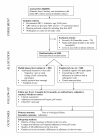Design of a randomized trial to evaluate the influence of mobile phone reminders on adherence to first line antiretroviral treatment in South India--the HIVIND study protocol
- PMID: 20346136
- PMCID: PMC2858730
- DOI: 10.1186/1471-2288-10-25
Design of a randomized trial to evaluate the influence of mobile phone reminders on adherence to first line antiretroviral treatment in South India--the HIVIND study protocol
Abstract
Background: Poor adherence to antiretroviral treatment has been a public health challenge associated with the treatment of HIV. Although different adherence-supporting interventions have been reported, their long term feasibility in low income settings remains uncertain. Thus, there is a need to explore sustainable contextual adherence aids in such settings, and to test these using rigorous scientific designs. The current ubiquity of mobile phones in many resource-constrained settings, make it a contextually appropriate and relatively low cost means of supporting adherence. In India, mobile phones have wide usage and acceptability and are potentially feasible tools for enhancing adherence to medications. This paper presents the study protocol for a trial, to evaluate the influence of mobile phone reminders on adherence to first-line antiretroviral treatment in South India.
Methods/design: 600 treatment naïve patients eligible for first-line treatment as per the national antiretroviral treatment guidelines will be recruited into the trial at two clinics in South India. Patients will be randomized into control and intervention arms. The control arm will receive the standard of care; the intervention arm will receive the standard of care plus mobile phone reminders. Each reminder will take the form of an automated call and a picture message. Reminders will be delivered once a week, at a time chosen by the patient. Patients will be followed up for 24 months or till the primary outcome i.e. virological failure, is reached, whichever is earlier. Self-reported adherence is a secondary outcome. Analysis is by intention-to-treat. A cost-effectiveness study of the intervention will also be carried out.
Discussion: Stepping up telecommunications technology in resource-limited healthcare settings is a priority of the World Health Organization. The trial will evaluate if the use of mobile phone reminders can influence adherence to first-line antiretrovirals in an Indian context.
References
-
- Towards universal access: scaling up priority HIV/AIDS interventions in the health sector. http://www.who.int/hiv/pub/2009progressreport/en/index.html
-
- Friedland GH, Williams A. Attaining higher goals in HIV treatment: the central importance of adherence. AIDS. 1999;13(Suppl 1):S61–72. - PubMed
Publication types
MeSH terms
Substances
LinkOut - more resources
Full Text Sources
Medical
Miscellaneous


